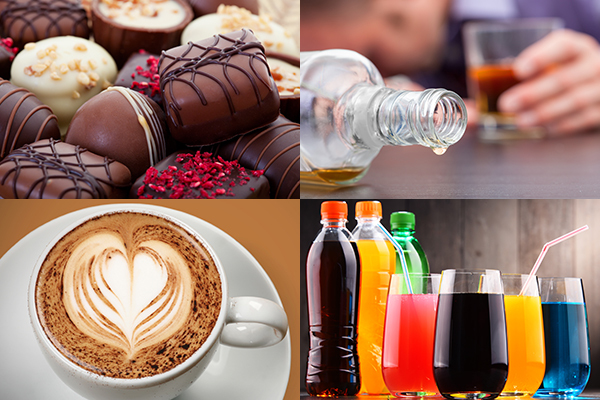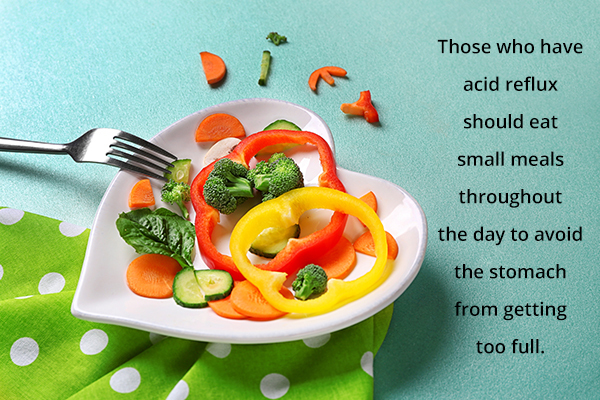In this article:
Acid reflux and heartburn are some of the most commonly reported digestive issues all over the world. Although not a grievous health concern, both these problems can be quite discomforting, especially if they become chronic.

In such cases, your dietary choices play an important role in keeping things under control. Diet pertains not just to the foods that you should eat but more importantly to the ones that you must avoid since they can aggravate the problem. Read on to know more.
What Foods Should Be Avoided When Suffering From Acid Reflux and Heartburn?
The following foods are recognized as common triggers for acid reflux, but they may not affect everyone:
1. Chocolate
Chocolate has a high fat content and should be limited if it is a trigger for the individual with acid reflux. (1)(2)
Foods that are high in fat not only cause the LES to relax, but also tend to remain in the stomach for a longer period. When food remains in the stomach for a long period, favorable conditions are created for acid reflux to occur. (3)
2. Alcohol
The lining of the esophagus is very delicate. Alcohol irritates this delicate lining due to its drying effect. Alcohol also disrupts the protective mucosa on the esophagus. (4)
Repeated damage to the esophageal lining can even increase the risk of esophageal cancer.
3. Coffee
Coffee can increase the pressure in the stomach and can also cause the LES to relax. (5)
4. Carbonated drinks
The gases produced in carbonated drinks can cause increased pressure in the stomach, which causes the LES to relax. Carbonated drinks that are caffeinated can cause the LES to relax as well. (6)

5. Citrus fruits (acidic)
Citrus fruits that have a low pH, such as tomatoes, can irritate and damage the protective layer of the esophagus. (7) The irritation and the damage to the esophageal lining can cause the burning sensation of heartburn.
6. High-fat meats and cheese (high in fat)
Meats that are high in fat and cheeses can cause a delay in the stomach’s digestion process. Therefore, the delayed emptying of the stomach can cause the LES to relax. (8) Therefore, the stomach’s contents bypass the LES and backflow into the esophagus.
7. Peppermint
Peppermint can relax the LES, which is located between the stomach and the esophagus. (9) The relaxation of the LES can cause acid reflux.
8. Garlic
Garlic contains a nutrient that can cause inflammation in the lining of the esophagus and can increase stomach acid production.
9. Fried foods
Fried foods can aggravate acid reflux due to their fat content. Instead of deep-frying foods, pan searing or baking your food items instead would be more beneficial in the management of acid reflux. (2)

Difference Between Acid Reflux and Heartburn
The digestive process begins in the mouth, where the food is chewed into small bits and mixed with saliva to make it easier to swallow. The food then passes down the esophagus, or food pipe, into the stomach, where it mixes with digestive acids such as bile that further breaks it down.
The bottom of the esophagus is encircled by a ring-shaped muscle called the lower esophageal sphincter (LES), which keeps it tightly shut and relaxes only to allow the passage of swallowed food and fluid into the stomach.
The LES plays a very important role in keeping down the stomach contents. However, if this muscle becomes weak or dysfunctional due to some reason, the acidic contents of your stomach will easily flow back into the food pipe, causing irritation and tissue damage. (10)
This backflow of stomach contents into the esophagus is referred to as acid reflux. Heartburn, on the other hand, is defined as the burning sensation in the chest or throat caused by the backflow of stomach acids into the esophagus. (11) Thus, heartburn is a symptom of acid reflux, rather than a condition.
What Lifestyle Changes Should Be Made in Context With Acid Reflux?
Research has shown that exercising can help manage acid reflux in individuals that are classified as obese. Acid reflux can also cause inflammation in the lining of the esophagus.
Eating well-balanced meals such as the anti-inflammatory diet or the Mediterranean diet can be beneficial for those who have acid reflux. (12)
What Other Eating Precautions Should Be Taken When Suffering From Acid Reflux?

Those who have acid reflux should eat small meals throughout the day to avoid the stomach from getting too full. (13) If the stomach becomes too full, the LES can become too relaxed and can cause acid reflux.
Final Word
Eating right is central to managing acid reflux and avoiding heartburn. In general, foods that cause a delay in digestion, acidic foods, foods that cause the LES to relax, and foods that cause the body to produce an excess of stomach acid should be limited and/or monitored in the diet. (14)
Meal plans that are low in fat and contain low-acidic fruits and vegetables are beneficial in managing acid reflux. However, foods that trigger acid reflux may vary from person to person. The key is to make sure that you keep a log to monitor your symptoms to identify the foods that trigger your acid reflux.
Dietary changes should be combined with a healthy, active lifestyle to keep your digestive system running smoothly. If your experience acid reflux or heartburn quite frequently, it’s best to consult a doctor for proper assessment and treatment. Sometimes these gastrointestinal symptoms stem from other more serious underlying ailments, such as heart problems.
- Was this article helpful?
- YES, THANKS!NOT REALLY


